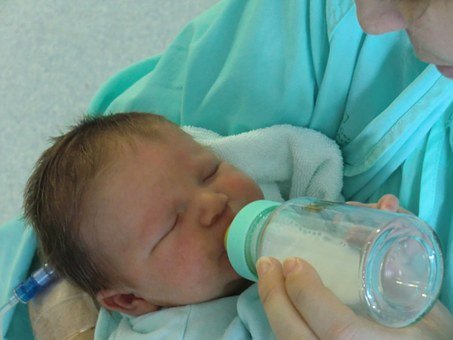Symptoms of Dairy Allergies in Breastfed Babies

For babies that are exclusively breastfed, it is difficult to know when they have a food allergy to dairy because they do not directly consume any food products. In addition, infants are usually not able to get an allergy test in the early months of life. However, there are signs and symptoms that could suggest an allergy in breastfed babies whose mothers take dairy. Nursing mothers who suspect a milk allergy in their breastfed babies can cut out dairy in their own diet to help determine the cause of these signs and symptoms.
Common Signs and Dairy Allergy Symptoms in Infants
Eczema in Breastfed Babies
Eczema is a skin condition that is marked by dry, flaky skin patches that can eventually get blistered and raw from scratching. The skin could have patches of eczema around the inner elbows and knees, as well as on the stomach area. Many babies with dairy allergies get eczema that worsens when exposed to dairy in breast milk.

It is important to note that some infants just naturally have dry skin which could cause eczema. Adequate moisturizing of the skin with the proper products in this case would remedy the problem. However, an improvement in eczema after removing dairy products from a lactating mother's diet can be a tell-tale sign of a dairy allergy.
Blood in the Stools and Reflux in Babies
Blood in the stool of breastfed babies may indicate a milk protein allergy. The blood usually appears as streaks in the stool of the infant. A nursing mother should try to eliminate suspected dairy products for some days to determine if this is the cause of blood-streaked stools in their infant.

Another sign related to stools in dairy allergic babies is soreness in the diaper area especially after passing stool. Breastfed babies with milk allergies will also tend to vomit or spit up more when exposed to dairy products through their mother's breast milk.
Fussiness and Gas Pain in Babies
Fussiness due to stomach discomfort and gas pain after breastfeeding could signify an allergy to dairy in a breastfed infant. The infant will get fussy after breastfeeding when the mother has had dairy in her diet.

To determine this, the lactating mother should keep track of when dairy products were consumed and if this coincides with fussiness in the breastfed baby, it could be a reaction to the dairy products being passed through the mother's milk.
Warning
Be sure to check for names of other ingredients indicating the presence of dairy ingredients when reading labels of foods consumed by the nursing mother. If the above signs and symptoms still occur even after elimination of any exposure to dairy through breast milk, the problem may not be a dairy allergy. The surest way to know if your breastfed infant has a dairy allergy is for them to get tested when they are old enough by a food allergist.